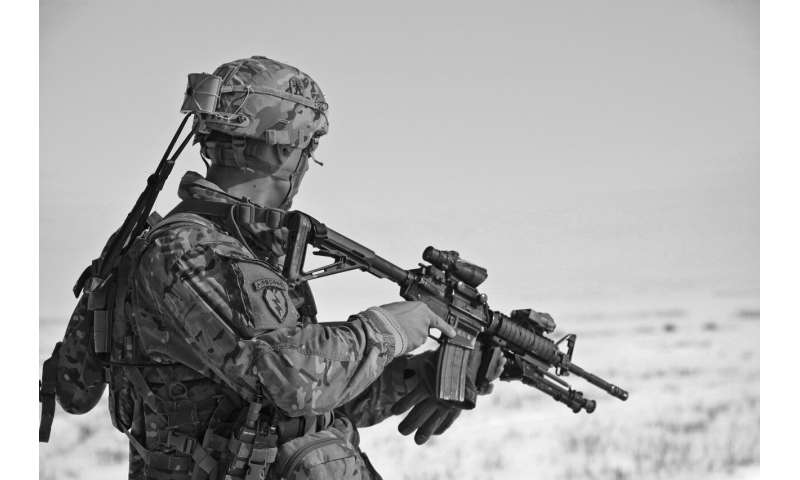A saliva test for soldiers, athletes, and others aims to predict performance

You're due to run a grueling road race in a few hours. Do you have the stuff to make it across the finish line or will you crash before the end? Or maybe you've got a ballet recital or a poker tournament or a big speech—some demanding physical or cognitive challenge is looming, and you need to know that your brain and body are up to it. What if, instead of relying on a vague gut feeling, you could turn to cold, hard data?
That's the goal of a multi-institutional, cross-disciplinary project led by Alexander A. Green, a Boston University College of Engineering associate professor of biomedical engineering. With up to $17.7 million in federal funds over four years, Green and his colleagues plan to develop a fast, portable saliva test that will analyze an assortment of biomarkers associated with performance on challenging tasks. It could be used to test readiness and the likelihood of success—with results in just 30 minutes.
The project is funded by the US Defense Advanced Research Projects Agency (DARPA), which aims to develop a test that will one day save lives and dollars by predicting soldiers' performance on missions. For example, if a pilot isn't in the optimal zone, that's good information to have, allowing the mission team to take extra precautions. The project's formal name is Smart Paper-Integrated Technologies for Interrogating Readiness (SPITFIRE).
Like the internet, microwave ovens, and aviator sunglasses, Green's test ultimately might gain use far beyond the military.
"I see it as a platform technology," Green says. "We demonstrate it here, in war-fighter readiness, but it's something that could be applied to help everybody."
Readiness and performance biomarkers
Green and his team will start by testing volunteers as they undergo rigorous physiological tests.
"They might be running on a treadmill in the lab or out in the field doing military training exercises for multiple days with little rest," says Green. "We'll take samples from people subjected to these challenges to see how their performance can be associated with different biomarkers," such as testosterone, cortisol, and myoglobin—in all, possibly a dozen or more biomarkers across three categories: RNA, protein, and metabolites.
"It's a complex challenge," says Green. He has long experience in developing paper-based testing systems, known as assays, such as a test for the Zika virus. In the case of a virus test, however, the assay is evaluating one or, at most, two biomolecules, indicating whether or not a pathogen is in the body.
"But in the present work, all the biomarkers are in all of us all of the time. So, it's really a challenge of quantification," says Keith Pardee, Green's longtime colleague and a collaborator on the project. He's a former BU postdoc and is now at the University of Toronto, where he's an associate professor and Canada Research Chair in Synthetic Biology and Human Health. The testing device would serve as a kind of personal dashboard, showing the levels of the biomarkers of interest. "It's maybe 20 or so different things that are always in the body to varying extents. But is the combined profile of those things predicting high or low performance, or something in between?"
Scientists at GE HealthCare's Technology & Innovation Center will take the data from the volunteer samples and develop a machine learning model to help figure out that mix of levels that will determine readiness. "Some of the molecules might need to be present in the saliva at higher or lower concentrations," Green says.
The GE center, formerly part of GE Research, has been working with DARPA for several years to identify biomarkers for readiness, says Erik Kvam, a senior scientist at GE HealthCare.
"This new initiative is one of the first to try to find multimodal molecular signatures from saliva," Kvam says. "There are rich biomarkers available, but they're often locked up in less accessible samples," like blood and tissue.
Predict athlete performance, assess maternal health, and more
Although DARPA's first priority is armed forces readiness, the device could have a variety of uses in civilian homes and clinics. An obvious application is in elite athlete training. "In the lead-up to some big competition, like the Olympics, you could test yourself daily to find out what the conditions are when you have peak performance," Green says.
The researchers also envision the test being used to assess maternal health during a pregnancy, or even the likelihood of a transplant organ's rejection, among other health applications.
"We're looking at extreme physical stress and the impact of that on physical and cognitive wellness, but that has broad potential," says Pardee. "And the infrastructure we're building can then be repositioned to any other set of biomarkers."
Kvam points out how the COVID-19 pandemic heightened awareness of the critical value of rapid testing at home.
"I know BU had a program that did testing much faster, but for the vast majority of people, it was something like a three-day turnaround," Kvam says, referring to lab-based PCR tests. "SPITFIRE is about advancing the state of the art for micro-monitoring and decision-making at the point of need—that is a need that became all the more apparent during COVID."
In addition to the University of Toronto and the GE center, other collaborators on the project hail from the University of Connecticut and the National Research Council Canada.
"You've got experts from these different areas coming together to hopefully solve a problem that wouldn't be possible without the same set of people," says Green. "It's exciting to move forward on this."
Provided by Boston University